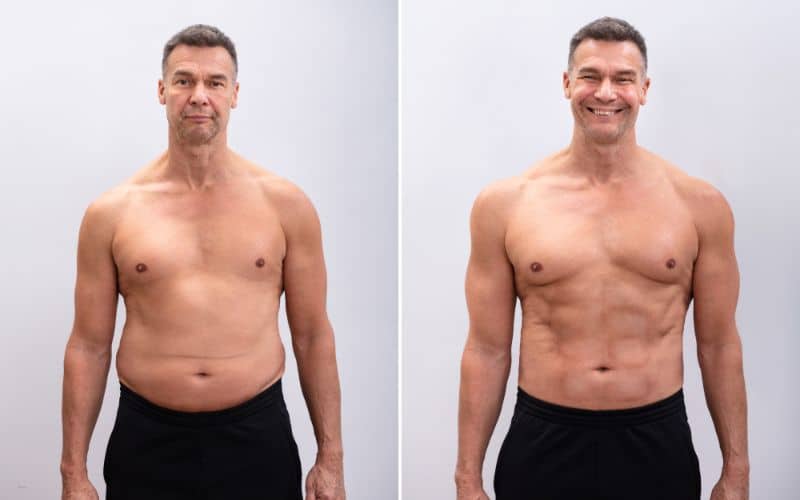Weight loss and body recomposition are two terms that are often used interchangeably, but they refer to different goals. While weight loss focuses on shedding excess body fat, body recomposition emphasizes building muscle mass while simultaneously reducing fat tissue.
The primary difference between weight loss and body recomposition lies in their respective approaches to body composition. Weight loss targets fat and is often measured by the number on a scale, while body recomposition focuses on replacing fat mass with muscle mass. This means that while weight loss may result in a lower number on the scale, body recomposition may lead to a higher number due to the increase in muscle mass.
Body recomposition is an approach to weight loss that emphasizes the importance of not only losing fat but gaining muscle at the same time. It involves a combination of diet and exercise to achieve a leaner, more toned physique. By building muscle mass, the body becomes more efficient at burning calories, which can help with long-term weight management. While body recomposition may take longer to achieve than traditional weight loss, it can result in a more sustainable and healthier approach to weight management.
Contents
Understanding Weight Loss

Definition of Weight Loss
Weight loss is a reduction in body weight that can occur intentionally or unintentionally. It is typically achieved by reducing the number of calories consumed, increasing physical activity, or a combination of both. Weight loss can be measured using a variety of methods, including body mass index (BMI), body fat percentage, or simply by weighing oneself on a scale.
Causes of Weight Loss
Weight loss can be caused by a variety of factors, including changes in diet, physical activity, and underlying medical conditions. For example, eating a diet high in processed foods and added sugars can lead to weight gain, while consuming a diet high in protein and fiber can promote weight loss.
Physical activity can also play a significant role in weight loss. Engaging in regular exercise can help burn calories and increase muscle mass, which can boost metabolism and aid in weight loss.
In some cases, weight loss may be a symptom of an underlying medical condition, such as thyroid disease or cancer. It is important to consult a healthcare professional if weight loss is sudden or unexplained.
Overall, weight loss can be a complex and multifaceted process that requires a combination of dietary and lifestyle changes. By understanding the definition and causes of weight loss, individuals can make informed decisions about their health and weight loss goals.
Understanding Body Recomposition

Definition of Body Recomposition
Body recomposition is a process that involves simultaneously building muscle mass and losing body fat. The objective of body recomposition is to improve body composition by decreasing body fat percentage while increasing lean muscle mass. This process is different from weight loss, which focuses solely on reducing overall body weight.
Process of Body Recomposition
The process of body recomposition involves a combination of strength training, cardiovascular exercise, and proper nutrition. Strength training is essential for building muscle mass, while cardiovascular exercise is important for burning calories and improving cardiovascular health.
Proper nutrition is also crucial for body recomposition. The body needs a sufficient amount of protein to build and repair muscle tissue, and carbohydrates for energy during exercise. It is also important to consume healthy fats, vitamins, and minerals to support overall health.
Body recomposition is a gradual process that requires patience and consistency. It is important to track progress through measurements such as body fat percentage and circumference measurements rather than relying solely on the number on the scale.
In summary, body recomposition is a process that involves building muscle mass and losing body fat simultaneously. It requires a combination of strength training, cardiovascular exercise, and proper nutrition. Tracking progress through measurements such as body fat percentage and circumference measurements is important for monitoring progress.
Key Differences between Weight Loss and Body Recomposition
Goals
The primary goal of weight loss is to reduce overall body weight, with a focus on losing fat mass. The goal of body recomposition, on the other hand, is to change the body's composition by reducing fat mass and increasing muscle mass. While weight loss is often measured by the number on a scale, body recomposition is measured by changes in body composition, such as a decrease in body fat percentage and an increase in muscle mass.
Methods
Weight loss is typically achieved through a calorie deficit, which means consuming fewer calories than the body burns. This can be done through a combination of diet and exercise. Body recomposition, on the other hand, involves a combination of strength training and a balanced diet with a focus on increasing protein intake. This helps to build muscle while reducing fat mass.
Impact on Body
Weight loss can result in a loss of both fat and muscle mass, which can lead to a decrease in metabolism and a loss of strength. In contrast, body recomposition can lead to an increase in muscle mass, which can increase metabolism and improve overall strength and fitness. Additionally, body recomposition can result in a decrease in body fat percentage, which can improve overall health and reduce the risk of chronic diseases.
In summary, weight loss and body recomposition have different goals and methods. While weight loss focuses on reducing overall body weight, body recomposition aims to change the body's composition by reducing fat mass and increasing muscle mass. Both approaches can lead to improved health and fitness, but body recomposition may be a more effective approach for those looking to improve body composition and overall strength.
Common Misconceptions

There are several common misconceptions about weight loss and body recomposition that can make it difficult to achieve your goals. Here are a few of the most prevalent myths:
- Myth 1: You can't build muscle while losing weight. Many people assume that losing weight means losing muscle mass, but this isn't necessarily true. In fact, with the right diet and exercise plan, it's possible to lose fat while simultaneously building muscle. This is known as body recomposition, and it can be a more effective way to transform your body than simply focusing on weight loss.
- Myth 2: You need to cut calories drastically to lose weight. While it's true that you need to create a calorie deficit to lose weight, cutting your calories too drastically can actually be counterproductive. When you don't eat enough, your body goes into "starvation mode" and slows down your metabolism, making it harder to lose weight. Additionally, cutting calories too drastically can cause you to lose muscle mass instead of fat.
- Myth 3: Cardio is the best way to lose weight. While cardio can be an effective way to burn calories, it's not the only way to lose weight. Strength training is also important for weight loss and body recomposition, as it helps build muscle mass and increase your metabolism. In fact, many experts recommend a combination of cardio and strength training for optimal results.
- Myth 4: You can spot-reduce fat. Unfortunately, it's not possible to target specific areas of your body for fat loss. When you lose weight, you lose fat from all over your body, not just from the areas you're targeting. However, strength training can help tone and tighten specific areas, giving the appearance of a more sculpted physique.
By understanding these common misconceptions, you can create a more effective plan for achieving your weight loss or body recomposition goals. Remember, it's important to focus on sustainable, healthy habits rather than quick fixes or fad diets. With patience and persistence, you can achieve the body you want.
Choosing the Right Path
When it comes to fitness goals, choosing the right path can be a daunting task. This is especially true when deciding between weight loss and body recomposition. While both paths can lead to a healthier and fitter body, there are several factors to consider before making a decision.
Factors to Consider
One of the most important factors to consider is your current body composition. If you have a high percentage of body fat, weight loss may be the best place to start. However, if you are already at a healthy weight but want to improve your overall body composition, body recomposition may be a better fit.
Another factor to consider is your fitness level. If you are new to exercise or have a history of injuries, it may be best to start with weight loss before moving on to body recomposition. This will help you build a solid foundation of fitness and reduce the risk of injury.
Finally, it's important to consider your personal preferences and goals. If you enjoy cardio workouts and want to see the number on the scale go down, weight loss may be the best fit. On the other hand, if you want to build strength and see visible muscle definition, body recomposition may be more appealing.
Professional Guidance
No matter which path you choose, it's important to seek professional guidance. A certified personal trainer or registered dietitian can help you create a personalized plan that takes into account your individual needs and goals.
A personal trainer can help you design a workout plan that is safe and effective, while a registered dietitian can help you create a nutrition plan that supports your fitness goals. Together, they can help you achieve your desired results in a healthy and sustainable way.
In conclusion, choosing between weight loss and body recomposition requires careful consideration of several factors. By taking into account your current body composition, fitness level, and personal preferences, you can make an informed decision about which path is right for you. And with the help of a certified personal trainer or registered dietitian, you can achieve your fitness goals safely and effectively.





